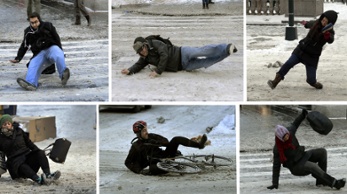While some people may enjoy the time off gained from a snow day, snow and other winter conditions can affect more than just a daily routine. Snow and icy conditions can cause a hazardous commute for pedestrians, and might result in serious injury from a slip and fall. In addition, snow or ice dislodged from a moving vehicle can cause serious injury to pedestrians and motorists alike. While Philadelphia has not received as much snow from the recent super-storms as other northeastern states, it is important to be aware of your responsibilities when it comes to snow or icy conditions on your property.
Residential Snow Removal
Generally, a homeowner is responsible for ensuring that the sidewalks, driveways, walkways, or other similar areas are clear of snow or ice. Under Philadelphia Code §10-720, a homeowner has only six hours from the end of the snowfall to clear any sidewalks surrounding or abutting the premises. As for occupants of rental properties, the landlord is generally responsible for taking care of the property, but it is always best to check the lease to make sure who is responsible.
Businesses
Businesses may also incur liability for failing to maintain safe conditions on their property. Parking lots, adjacent sidewalks, and even business entrances can prove hazardous when snow and icy conditions are present, and business owners should be particularly aware of all types of hazards present on their property since they are inviting customers onto their property.
Hills and Ridges Doctrine
Generally, if a slip and fall case involving icy conditions goes to trial, the court would apply the “Hills and Ridges Doctrine” in order to determine fault. In order to succeed in a claim for damages, a plaintiff must show:
– That travel was obstructed by an unreasonable, natural, accumulation of snow and ice;
– That the property owner knew or should have known of such conditions;
– That the snow and ice are what caused the plaintiff to slip and fall;
– That the conditions were allowed to exist for an unreasonable amount of time under the circumstances.
It should be noted that if the obstruction or icy condition is caused by human intervention, then the court would not apply the “Hills and Ridges Doctrine.” While homeowners and business owners get a lot of attention in snow or icy conditions, it is important to note that they are not the only ones that need to take the appropriate measures to ensure the safety of others.
Clearing Your Vehicle
While it may seem like a hassle to clear your car of that last bit of snow on the roof, snow can easily melt and refreeze into ice, which can cause serious injury to any pedestrian that might be struck by ice dislodged from your car when you drive. Under Pennsylvania law, 75 Pa. Code 3720, a person operating a motor vehicle may be fined from $200 to $1,000 for each offense resulting in dislodged snow or ice causing death or serious bodily injury. Furthermore, someone who is injured by snow or ice that is dislodged from a moving vehicle may claim damages from the responsible party.
If you or a loved one has been injured in either a slip and fall incident, or by dislodged snow or ice from a moving vehicle, it is important for you to contact one of the dedicated attorneys of Stampone Law for a free, confidential consultation.
